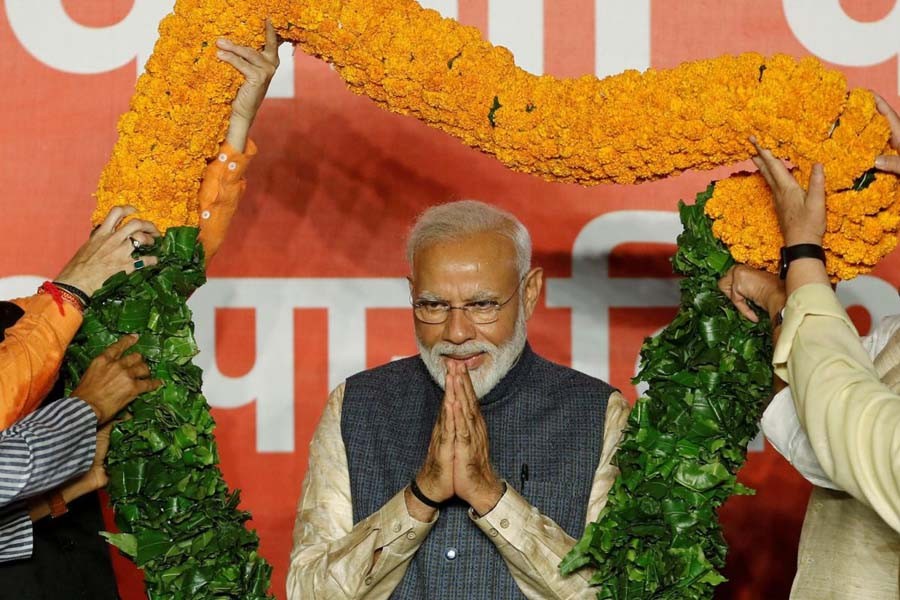
'India now belongs to Hindus only', is the simple definition of Hindutva. And the Hindu nationalist BJP’s landslide victory in the 2019 elections proves it

With the Hindu nationalist Bhartiya Janata Party’s (BJP) landslide victory in the 2019 elections, the people of India have buried secularism and raised the saffron flag with Hindutva slogans at New Delhi. The Indian voters also hit a final nail in the coffin of hereditary politics of Congress-I as its president, Rahul Gandhi, lost his seat to BJP’s Smriti Irani from his family’s long-held home constituency in Utter Pradesh.
"India now belongs to Hindus only," is the simple definition of Hindutva. Space for minorities, including Muslims, Christians, Sikhs and even low-caste Hindus which remained hostile during the first five years rule of Narendra Modi, seems to be further shrinking in the next five years.
Killing of dozens of Muslims and low-caste Hindu Dalits by the saffron-clad Hindu extremists in the name of cow protection in different parts of the country has raised legitimate fears that secularism and pluralism have no more space in Modi’s India.
Today it is not Mahatma Gandhi’s India who believed in non-violent politics. It is the India ruled by BJP, the forward-face of Rashtriya Swayamsewak Sangh (RSS), which openly calls Mahatma Gandhi’s killer Nathuram Vinayak Godse a national hero. The RSS, with whom Narendra Modi remained associated before becoming the chief minister of Gujarat in 2002 and Shiv Sena, another Hindu extremist party, vigorously pursued the Hindutva ideology -- Hindu nationalism and Hindustan belongs to Hindus -- during the first tenure of Narendra Modi and that apparently worked for the BJP in the 2019 general elections.
On May 23, when the BJP was celebrating victory in New Delhi and other parts of India, there was mourning in Indian-Occupied Kashmir over the martyrdom of 14 Muslims who were killed during the so-called search operations in different parts of the valley by the Indian security forces. Amid curfew, curbs on internet and disconnection of cell phone services, the main Hurriyat leadership in Srinagar, including Syed Ali Gillani and Mirwaiz Umar Farooq, were house arrested.
This is a clear indication that there will be no changes in policies on the occupied state of Jammu and Kashmir, where the Indian security forces, having impunity under the draconian ‘The Armed Forces Special Powers Act’, can enter any house in the valley on the pretext of search operation and kill civilians.
Unfortunately, the world has been turning a blind eye to the Kashmiri Muslims sufferings during the first term of Narendra Modi, who has established close ties with Israel as the two seem to be bonded together by their common inborn hatred towards Muslims. Currently, Israel is the third largest arms supplier to India, which is also reportedly helping Indian troops in modern techniques to suppress the Kashmiris’ freedom struggle.
In addition, in the last five years, India has come closer to the United States after recent shift in its policies in Afghanistan and particularly South Asia. And with the new axis of Washington, Tel Aviv and New Delhi, the pain of hapless and voiceless Kashmiri Muslims has multiplied.
The Hindu hardliners are also trying to revoke the special status of the valley under Article 370 of the Indian Constitution. The BJP has clearly mentioned this in its manifesto.
Pakistan must carefully watch the first 100 days of Narendra Modi’s second term in the government which will be very important to gauge Indian policies in the region and towards Pakistan.
There is no doubt that the BJP secured votes on anti-Pakistan and anti-Muslim narratives as during the last five years, the government of Narendra Modi had made many changes in the curriculum and renamed over 100 cities, towns, villages and railway stations -- Muslim names to ancient Hindu names. Faizabad district changed to Ayodhya, best known as the birthplace of Hindu god Ram in Utter Pradesh; Mughalsarai, an iconic British-era railway station in the same state, is renamed after its ideologue Deendayal Upadhyaya. But the most important one was the city of Allahabad in Utter Pradesh which was renamed Prayagraj. And now in the second term of Narendra Modi, it is expected that soon the name of Ahmedabad city in Gujarat state will be changed.
But if there are some changes in the next cabinet and advisors in the Indian government then there is a slight possibility of changes in the policies of BJP from the past five years, in which New Delhi avoided to talk to Pakistan at any level. The important regional forum, Saarc, has been made defunct intentionally by the BJP government in the last five years.
But hopes should remain alive for resumption of dialogue, with the beginning from people-to-people contact and promotion of religious tourism between the two countries. Thorny issues like Kashmir, water, Siachen, Sir Creek and terrorism, can be discussed once the baby step is taken for improvement in ties.
If Nardenra Modi invites Pakistani Prime Minister Imran Khan to his oath-taking ceremony, there are chances that both the countries will explore further avenues to bring peace in the region.
The visit of Nawaz Sharif to New Delhi five years ago on the oath-taking ceremony of Narendra Modi was termed a bad decision by many analysts at that time. But since the situation has gone worse after the Pulwama attack, the visit of Imran Khan might help defuse the tension.
shafiqstateman@hotmail.com